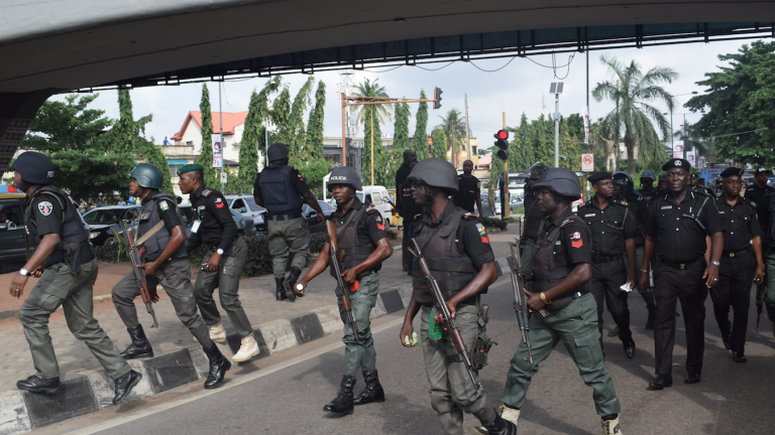Latest News
Police beef up security in Abuja as Shi’ites hold procession

The Nigeria Police Force on Monday beefed up security in and around the Federal Capital Territory (FCT) to prevent a major procession by members of the Islamic Movement of Nigeria (IMN).
Motorists plying the Abuja-Keffi Expressway due to the development were stranded as a result of traffic jams on the road.
Most hit are those exiting Abuja and heading towards Karu, Nyanya and travelers going towards Nasarawa State.
Armed security men barricaded the road to prevent breakdown of law and order.
When contacted, the FCT Police Command spokesperson, DSP Josephine Adeh confirmed the incident but said the IMN members did not enter the FCT.
She said: “They did not enter FCT. They stopped at the Orange market and turned back. The Commissioner of Police deployed some officers, but since they did not come into FCT there was no crisis”.
According to a statement by a representative of Sheikh Zakzaky’s followers, in Sokoto State, Sheikh Sidi Munir, the procession is commemorated annually by the Islamic movement, following an Arbaeen Symbolic trek by millions of people from across the country.
Sidi Munir who led the procession explained: “Though we started with few people and confined ourselves to a particular place and recited some supplication. We thank Allah now we trek in millions, an indication that people are gradually beginning to realize the lofty position of Imam Husain (AS) in Islam.
“The purpose of the symbolic trek is to recall and experience the trial and tribulation faced by the Household of the Holy Prophet (AS), chained and dragged in scorching desert, barefoot from Karbala in Iraq to Damascus in Syria after the killing of Imam Husain 61 years after Hijra.
“It was a period of anger and anguish at the perpetrators of injustice not just in the plain of Karbala but the world over.
“Today, the general public have witnessed how the Arbaeen trek like those before ended without any attempt to curb the right of safe passage to other road users. No panic was created by our Arbaeen trek. Love for Imam Husain (AS) is not the exclusive right of Muslims only.
“Because of the gruesome attack on the Imam at Karbala, the fortieth day after is commemorated by and for all those who love justice and fight against oppression in all ages, including ourselves. That is why we always welcome our brothers and sisters whom; of their own free will, trekked with us today”.
Latest News
Ondo, Edo, Bauchi account for 70% of lassa fever cases – NCDC

The latest report of lassa fever from the Nigeria Centre for Disease Control (NCDC) showed that as of July 24, 2022, Indo, Edo and Bauchi states contributed 70 percent of the total cases of Lassa fever in the country.
Ondo, Edo and Bauchi recorded of 30 per cent, 26 per cent, and 14 per cent respectively.
It also revealed that between July 18 and 24, new confirmed cases increased to 10 from five the previous week.
Two persons lost their lives during the period under consideration. Therefore, since the beginning of the year, the total confirmed cases of Lassa fever are 857, with 164 total deaths reported.
The NCDC said, “Cumulatively from week 1 to week 29, 2022, 164 deaths have been reported with a Case Fatality Rate (CFR) of 19.1 percent, which is lower than the CFR for the same period in 2021 (23.7 percent).
“In total for 2022, 24 states have recorded at least one confirmed case across 99 Local Government Areas.
“Of all confirmed cases, 70 percent are from Ondo (30 percent), Edo (26 percent), and Bauchi (14 percent) states. The predominant age group affected is 21-30 years (Range: 0 to 90 years, median age: 30 years). The male-to-female ratio for confirmed cases is 1:0.8.
“The number of suspected cases has increased compared to that reported for the same period in 2021. One new Healthcare worker affected in Ondo State.
“National Lassa fever multi-partner, multi-sectoral Technical Working Group (TWG) continues to coordinate the response activities at all levels.”
To reduce the risk of the spread of Lassa fever, the NCDC offers the following advice: Ensure proper environmental sanitation – that is, keep your environment clean at all times, block all holes in your house to prevent rats from entering; Cover your dustbins and dispose of refuse properly. Communities should set up dumpsites very far from their homes to reduce the chances of having rodents within homes; Store foodstuff like rice, garri, beans, corn/maize, etc in containers that are well covered with tight-fitting lids.
Others are – Avoid drying foodstuffs outside on the floor, roadside where they will be exposed to contamination; Avoid bush burning which can lead to the displacement of rats from bushes to human dwellings; Eliminate rats in homes and communities by setting rat traps and other means; Practice good personal hygiene by frequent washing hands with soap under running water or use of hand sanitisers when appropriate, and visit the nearest health facility if you notice any of the signs and symptoms of Lassa fever as mentioned earlier, and avoid self-medication.
Latest News
Insecurity: FG urged to seek foreign help

The Federal Government of Nigeria has been advised to seek foreign help urgently in order to tackle the problems of insecurity in the country.
According to a statement by a renowned socio-political activist and critic, Chief Adesunbo Onitiri, this became very imperative to enable Nigerians to live in peace.
He also called on the government to declare a state of emergency on insecurity in order to tackle the problem with all the seriousness it deserved.
Onitiri said the only option left was to urgently seek foreign assistance.
“We wake up daily to hear news of our youths, women, and citizens being raped, kidnapped, maimed, and killed.
“While the country is in a state of war with the bandits, our students are out of school for over five months. All our higher institutions are under lock and key. This is unacceptable to Nigerians,” Onitiri lamented.
Onitiri explained that the Kuje Prison and the Kaduna military formations attacks were sour in the mouth. “It’s like our sovereignty as a nation has been eroded.”
Latest News
164 Die Of Lassa Fever As Cases Jump To 857

THE Lassa fever cases in Nigeria have jumped to 857 and 164 people have so far died from the disease in the first seven months of 2022.
The Nigeria Centre for Disease Control (NCDC) said this in its latest Lassa fever situation report for week 29, which showed that there were 857 confirmed cases of the disease in the country.
The NCDC said that the cases were distributed across 24 states and 99 local government areas in the country.
It said that 54 healthcare workers had been infected with the disease.
“A breakdown indicated that of all confirmed cases, Ondo has 30 per cent Edo, 26 per cent and Bauchi 14 per cent states.
“In week 29, the number of new confirmed cases increased from five in week 28, 2022 to cases. These were reported from Edo and Ondo States.
“Cumulatively from week 1 to week 29, 2022, 164 deaths have been reported with a case fatality rate (CFR) of 19.1 per cent which is lower than the CFR for the same period in 2021, 23.7 per cent.
“In total for 2022, 24 States have recorded at least one confirmed case across 99 Local Government Areas. Of all confirmed cases, 70 per cent are from Ondo, 30 per cent Edo 26 per cent and Bauchi 14 per cent cases.
“The predominant age group affected is 21-30 years range: 0 to 90 years, Median Age:30 years. The male-to-female ratio for confirmed cases is 1:0.8.
“The number of suspected cases has increased compared to that reported for the same period in 2021. One new healthcare worker was affected in Ondo State,” it said.
The News Agency of Nigeria (NAN) reported that Lassa fever is a viral hemorrhagic fever transmitted by rats.
It has been known since the 1950s, but the virus was not identified until 1969 when two missionary nurses died from it in the town of Lassa in Nigeria.
Even after recovery, the virus remains in body fluids, including semen. Neighbouring countries are also at risk, as the animal vector for the Lassa virus, the “multimammate rat” (Mastomys natalensis) is distributed throughout the region.
-

 Uncategorized23 hours ago
Uncategorized23 hours agoBreaking: Moon sighted in Saudi, UAE, others, Eid-Fitr holds Sunday
-

 metro2 days ago
metro2 days agoEFCC re-arraigns son of ex-PDP chairman for alleged N2.2bn oil subsidy fraud
-

 metro18 hours ago
metro18 hours agoRamadan ends in Nigeria, Sultan announces March 30 as Eid-el-Fitr
-

 metro1 day ago
metro1 day agoFubara reacts as Ex-HOS, Nwaeke accuses him of bombing oil pipelines, Rivers Assembly
-

 metro2 days ago
metro2 days agoWe welcome Gov Makinde’s U-turn on Shari’ah panel – MURIC
-

 Uncategorized2 days ago
Uncategorized2 days agoObasanjo’s position on Rivers emergency rule hypocritical, says Presidency
-

 Opinion1 day ago
Opinion1 day agoBarbaric mass burning of innocents in Edo, by Farooq Kperogi
-

 metro1 day ago
metro1 day agoEx-Rivers HoS wife cries for help over husband’s safety

